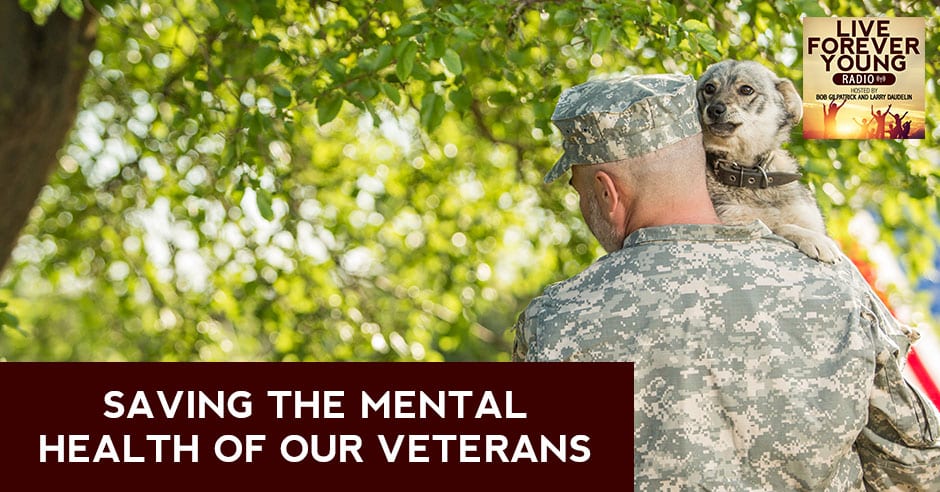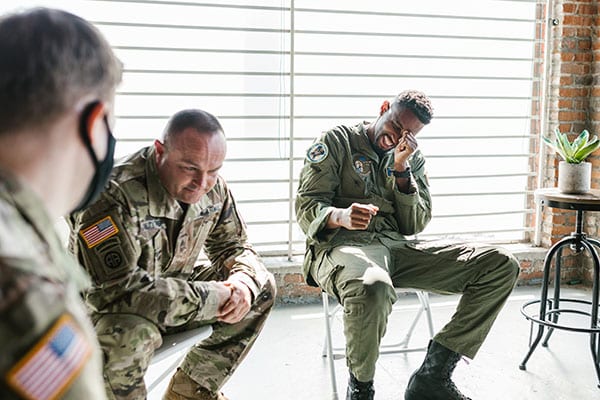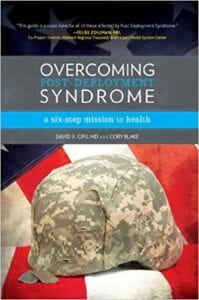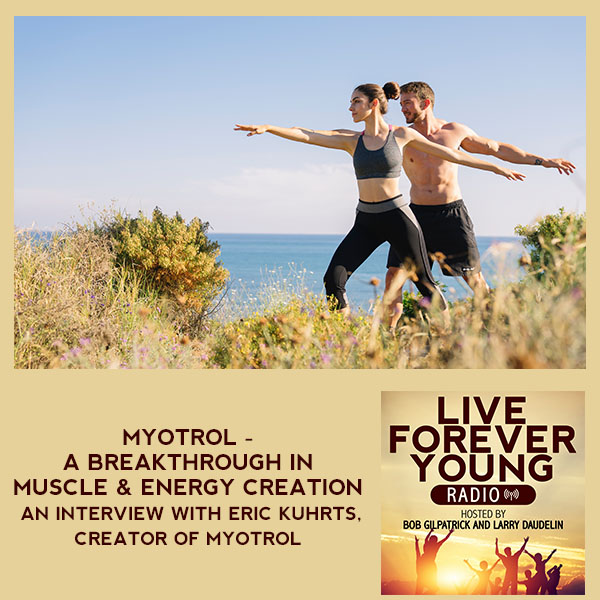
Roughly one in five of the 2.7 million Americans deployed to Iraq and Afghanistan since 2001 experience post-traumatic stress disorder and other mental health challenges. In this episode, Bob Gilpatrick and Rollie Culp discuss an ongoing study by The Pet Effect.org that looks into whether or not service dogs can help veterans with depression and anxiety recover. They also share a great book by Cory Blake and David Cifu called Overcoming Post Deployment Syndrome. Bob and Rollie identify some easy to use techniques to help overcome anxiety and depression that can help you get back to living your best life.
—
Watch the podcast here
Listen to the podcast here
Saving The Mental Health Of Our Veterans
Service Dogs Serving Our Veterans
How’s it going, Bob?
It’s going well, Rollie.
I got a new T-shirt. My wife got this in a contest. It’s whoever’s in the playoffs this year. On the back, number one is Tampa Bay Lightning. We all know they’re going to win but I have to represent the NHL as well. They’re not as good as the Lightning but they have a shot.
They have an outside chance. It might lean against the field.
All those other teams are probably very anxious because of the fact that they have to go battle the Lightning. One of the things we’re going to be talking about is a cool study we found. There are some cool things going on in the world with veterans. What we’re looking at doing is saving the mental health of veterans and there’s this cool study that’s been done. It’s about how service dogs can help serve veterans by helping them reduce anxiety and depression. It’s a staggering statistic. We’re looking this up in about 1 in 5 of 2.7 million Americans who’ve been deployed in Iraq and Afghanistan since 2001 have come back with PTSD, Post-Traumatic Stress Disorder.
Rollie, PTSD is a stress disorder that has certain characteristics. There’s also an overarching description that they call post-deployment syndrome. People might not have PTSD technically but they might have other things going on from being deployed, including maybe being seriously injured physically and they might have an amputation. They might have a head injury.
I’ve seen people with burns on their bodies.
Things like that are part of the post-deployment syndrome. As a result, they might have post-traumatic stress disorder also.
We all know that post-traumatic stress comes from life-threatening and traumatic events and there’s probably nothing more traumatic and life-threatening than going to war. These guys need our help and what’s cool is ThePetEffect.org is the name of the organization that is doing this study. Their main focus is to see if by giving veterans who’ve served our country proudly that have PTSD a service dog or a companion if that’ll help with these feelings of anxiety and depression and the re-acclimation into civilian society.
The studies and the information are good. It’s showing that a lot of the veterans who have the PTSD diagnosed are feeling a lot less depressed and anxious simply because of the fact they have a companion and what’s cool is they’re able to go to work more often. They’re able to be more productive because they’re not having so much of the depression, anxiety and panic attacks that they’re used to post-deployment.
The issue with work we see through our nonprofit project, Project Transition USA, focuses on helping people in the work aspect. When people are in the military for many years and they’re then leaving the military, they’re about to retire, they now need to learn a new set of skills in order to successfully begin to navigate the civilian world especially in the world of work. They have to be able to translate their skills in the military with all the codes and everything into what it means in the civilian world they also have to gain access to things like LinkedIn, which helps them to become visible to employers. They need to be able to learn to network. There are companies like STAR based in Tampa that do networking events for veterans to help them get matched up with mentors to help them get their first job.
With Project Transition, which I’m on the Board of Directors of for years now, right from when I first started we do training on the local Air Force Base. It’s the home of central command and special operations command, members from all the branches of the military come through our training, which lasts all day. We’ve trained about 5,000 people so far and there’s a LinkedIn group called Project Transition USA.
I was going to say the best place to find that is on LinkedIn. If you want to see a little bit more information, check out the LinkedIn profile but you can get some more information on BoomerBoost.com. We have the How Boomers Gives Back section and it’s on the homepage. If you go down about 2/3 of the way, you’ll see there are a couple of organizations that we’re affiliated with and Project Transition USA is one of them. It’s right on the front page.
One of the funny things too is there’s this great study that shows this is going to help with vets and it’s a good thing but we have, if you guys remember from one of our other shows, managing stress and anxiety. During trying times, we have our own office dog, Zella, a standard poodle and gorgeous dog. I have to admit, I could be sitting there frustrated because of something I’m trying to write or an email that I didn’t want to get but I got or whatever. She comes in with poufy hair and that frustration like, “Look at the dog. Come here.”
Having something like a dog to grab onto and love allows veterans to get PTSD out of their heads faster and move on. Share on XI could definitely understand how that would work. What they’re also finding is the things that the service dogs specifically are helping the vets with are things like the interruption of anxiety attacks throughout the day and a lot of that comes from we could sit in there, something hits us and we get frustrated. For someone with PTSD, that’s a lot more of a debilitating thing. It keeps them from being productive and moving forward. By having something there to grab onto and love on like a dog, it allows them to get that out of their head faster and move on to the next thing. That’s one of the things.
Another thing that they were saying in the study is the feeling of agoraphobia. You go out into a social setting, you’re in the aisle at the grocery store and they’re used to having to watch their backs. Without a dog or a companion, they’re out in the cold all alone. There’s this sense of security they were saying when they have a dog next to them. It’s like the dog’s got your back so that nobody can sneak up on you. It’s a sense of confidence and security that they instill. Similar in that manner is the minimization of panic attacks. Usually, that’s something that comes on by a trigger, a loud noise or something like that. They can help with that by minimizing it, letting them take the focus off of whatever was causing that feeling.
I heard that it also showed a reduction in their cortisol levels.
Yes. That’s one thing Bob loves because we hate cortisol. Cortisol is the stress hormone.
Too high amounts at the wrong time of the day, it’s a stress hormone. Your body needs cortisol to live but cortisol rises and falls throughout the day and you want it to be at the right amount during the nighttime and during the day. When you’re under a lot of stress especially during the day, you end up with way too much cortisol. It’s very damaging to your body because it creates inflammation.
We can talk about inflammation and if you don’t know about inflammation, you can check out our episode on managing chronic inflammation. There are tons of it on there. One of the good things about the fact that you have this reduction in cortisol, it allows them to be calmer. One of the other cool things is that the veterans say their relationships with loved ones are better because they’re more patient and able to communicate more effectively. They’re not as stressed out if there’s some stress that’s coming.
It goes well with nonviolent communication. The pet will make you calmer, less cortisol and we also can direct people to the show on Nonviolent Communication.

Veterans’ Mental Health: A lot of the veterans who have PTSD diagnosed feel a lot less depressed and anxious simply because of the fact that they have a companion.
How To Use Nonviolent Communication, we released it and it’s very helpful.
The combination of those two things could make the relationships go to the next level.
When you’re also transitioning into a new workplace as a veteran would be there’s a whole bunch of relationships that you probably wouldn’t even have the ability to deal with in a normal setting if you were dealing with PTSD. The ability to use NVC in coordination with the service dog to make that communication better, understanding how to do your job and what other people at your job need is key when you’re transitioning back into the work-life as a civilian.
They say people are happiest when they have friends and a job. Having friends is made easier when you have less anxiety and you have better communication skills. This type of information about service dogs can be helpful. Some people can’t get a service dog for whatever reason or they don’t want one. They don’t want to care for a dog like that.
The living situations too. You might not be able to have one.
We made another show on the Emotional Freedom Technique.
It’s called Tap Away Stress And Anxiety and we go over the technique. That would be something that you could use if you were finding yourself in that state and, for some reason, you couldn’t have a service dog or whatever the case is. That’s what we would talk about. It’s a way to tap into that subconscious anxiety that you’re always dealing with and reset it.
Tapping also works with your pets. If your pet has anxiety, you can do tapping for your pets.
You tap on them and you give that nice reassuring voice that they like to hear.
In too high amounts at the wrong time of the day, cortisol is a stress hormone. Share on XThe book we were talking about is called Overcoming Post-Deployment Syndrome by Cory Blake and David Cifu. Dr. Cifu is a renowned physician from up in Virginia who specializes in caring for veterans in all of their post-deployment syndrome needs. He cares for people with head traumas, amputations and he’s big into holistic health. He recommends that people use all the different things that we’re talking about here. He knows that it’s very challenging for the mental health side of things, equal to some of the physical challenges. That’s a great book for people to get if you are a veteran or if you know someone who’s a veteran, you want to better understand what they’re going through and what you can do to help. You can get it on Amazon.
I think I saw it on there. It was regularly $12.99 but they got a used version for $4.19.
I have one at home and have been reading it. It’s good. He has other books too but they’re more medical-oriented. He created an entire model for physicians and institutions to follow in analyzing, diagnosing and treating people with post-deployment syndrome with very detailed medical resources. The book Overcoming Post-Deployment Syndrome is a small book. That’s more for laypeople whereas these other books are for medical doctors.

Veterans’ Mental Health: People are happiest when they have friends and a job. Having friends is made easier when you have less anxiety and you have better communication skills.
That’s what I wanted to share. I thought it was cool. I don’t have much more to go over but I do want you to check out the study that we’re talking about. ThePetEffect.org is the place to go. Another thing is to check out Project Transition USA. Their LinkedIn is Project Transition USA.
That’s the website also if you want to go to that. If you’re on LinkedIn, just type in and search Project Transition USA.
This is important because these people who were out fighting for our freedom and doing all this so we can be here doing this and share this with you. We owe them. Go check it out, support it and thanks for reading.
Thanks for reading and we will see you at the next show.
Important Links:
- ThePetEffect.org
- Project Transition USA
- STAR
- BoomerBoost.com
- How Boomers Gives Back
- managing chronic inflammation – past episode
- How To Use Nonviolent Communication – past episode
- Tap Away Stress And Anxiety – past episode
- Overcoming Post-Deployment Syndrome
- Project Transition USA – LinkedIn







